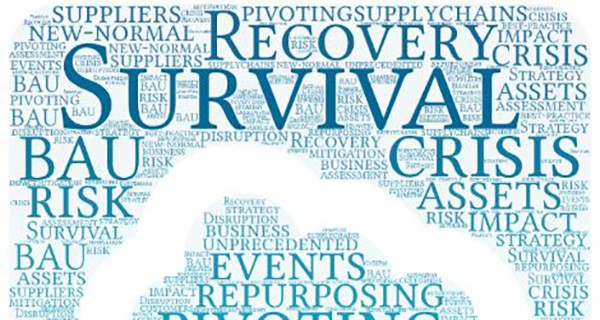STRATEGY AND SUPPLY SURVIVAL THROUGH CRISIS
Author: Laura Sullivan (Governance, Strategy Consultant)
Buzzwords abound. ‘Unprecedented’ events, ‘pivoting’ of strategy, and ‘repurposing’ of assets; the massive disruption to business strategy and supply chains resulting from the COVID-19 crisis has left many wondering what they can do to recover and put themselves back on track for business as usual (BAU) or on a new trajectory to a ‘new-normal’ for their business.
In a perfect world we would all be fully prepared for such a crisis with best practices (like these below) already in place:
- Customer and Supply chain mapping – maintaining full transparency of your critical customers and supply chain, including your primary suppliers and their suppliers, and so on.
- Identification of those customers and suppliers that are critical to your business.
- Risk and impact assessment of a disruption to any of these customers or suppliers, with mitigation plans in place.
- Well rehearsed outage scenarios to ensure you can effectively action your back up plans.
In reality, most businesses will have some of these in place. However, even without the benefit of hindsight, there is benefit in considering the above strategies. Creative thinking by those who know your business well may lead to innovative solutions – particularly when it comes to your people, your assets, and your customers.
Here are some additional short term strategies to consider;
Your people
Assuming you have done the essential and ensured the welfare of your people and their ability to keep working, consider also;
- Leveraging the contacts and information you can gain through your team and their extended network. Accuracy of information is paramount in any recovery from crisis (1). Those contacts you have who are on the ground or close to a possible supplier or customer may become critical.
- In a long term crisis you will also need to ensure your leadership team have sufficient back up (2). Think strategically – times of economic downturn cause organisations to consider cutting staff. Make sure you know who your key people are and consider ways you can keep them. This may include sharing key people across business units (3) or partners (4) or offering flexibility in working arrangements. Think of the airline workers now servicing grocery stores in Australia. Maintaining access to your key people will enable you hit the ground running when market conditions change.
- Focus on learning and development. Expose your team to the full aspect of your company’s value chain so they not only understand drivers of success but also have the opportunity to take the initiative to support your business through recovery. In my own experience a management consultancy pushed their team to go beyond the basics by asking them to participate in development of a new innovation through exposure to the full sales pipeline. This challenged them to both think and act in ways potentially outside of their comfort zone but led to new contacts and opportunities in other industries. In the long term this can also create best practice in your organisation.
- Above all, communicate, engage and keep your finger on the pulse of your people.
Your assets and operations.
You have probably paused parts of your business to preserve cash. Consider now how you may use them for strategic value. This may be as simple as thinking about what else you and your operations can do in crisis recovery (2)? For example;
- Louis Vuitton (LMVH) is making hand sanitiser in their perfume operations.
- U.K Formula One teams are making ventilators in their plants.
- An Australian management consultancy has refocussed their team to providing business recovery resources to businesses and communities through a Shared Value initiative (5).
Your customers
Develop creative ways to engage with current and future customers;
- If you can go virtual, go virtual in all things. People are willing to engage virtually and it is likely to become a best practice in future. As a minimum, have a virtual coffee. If you can go online with your sales, do it. Australia Post is experiencing more load than at Christmas time. Whether this is simply retail therapy or a view of the future, people are in a place of open willing engagement at the moment, making this an opportunity for many businesses.
It’s important to remember that downturns can also be a great time to grow. Challenge yourself to think outside the square. After all, in the words of a hockey great Wayne Gretzky, “you miss 100% of the shots you don’t take”.
References:
- https://hbr.org/2020/02/prepare-your-supply-chain-for-coronavirus
- https://www.linkedin.com/pulse/enable-your-emerging-leaders-through-crisis-laura-sullivan/
- https://www.linkedin.com/pulse/survive-thrive-through-crisis-laura-sullivan/
- https://hbr.org/2020/04/make-the-right-personnel-decisions-now-to-thrive-after-the-crisis
- https://sharedvalue.org.au/wp-content/uploads/2015/12/Harvard-Business-Review-Creating-Shared-Value.pdf
If your business requires assistance with non-financial Governance programs and procedures contact the HSSE team at Nuffield Group via email nuffield@nuffieldgroup.com or call 1300 308 257


